Last September I came back from maternity leave, mid pandemic, to reclaim my role as external engagement lead for the school of mathematics and statistics. I had particularly missed this aspect of my job: organising events with our academics, hosting school visits on campus, interacting with members of the public at national science fairs, and generally sharing a love of mathematics. As you can imagine, however, the role I returned to was somewhat different to the one I had left. As a school, we faced the challenge of facilitating our existing external engagement programme within the constraints of the “new normal”.
Working at the Open University, we are no strangers to working with students online, in fact all our mathematics education modules are delivered online with tutorials running through Adobe Connect software. As a university, we are experienced facilitators of online learning and this extends to our public engagement offerings, including our free Open Learn website (http://www.open.ac.uk/about/open-educational-resources/openlearn), our involvement in BBC productions, and sharing live broadcasts of public lectures and workshops through our Youtube and Facebook live channels, allowing us to reach a national (and sometimes international) audience.
Despite this strong online presence, within the school of mathematics and statistics we are proud to offer free face to face outreach activities for school pupils in the areas surrounding our campus. Like many other universities, we feel a strong sense of duty to provide outreach for local school students, encouraging them to take an interest in mathematics beyond compulsory education. Our offerings include our annual Mathematics Christmas lecture, attracting around 400 sixth form pupils and their teachers to our Milton Keynes campus, a six-week mathematics masterclass series for year 9 students every year at Bletchley Park, and hosting the Enigma Maths hub “Welcome to your mathematics A-level” conference, for year 11 students who are about to embark on their sixth form mathematics.
We offer these events to support local pupils in developing their interests in mathematics through exposing them to interesting topics outside of the normal mathematics curriculum. We invite speakers from varied professional backgrounds, from career mathematicians to experts in industry, so the pupils can learn about different career paths and, more importantly, be inspired. These events also give attendees the opportunity to meet pupils from other schools who have similar interests in mathematics, giving them the chance to collaborate and to develop their confidence in exploring and discussing mathematics in an informal setting.
This year, like schools, colleges and traditional universities, we have had to think creatively about how we could offer these face-to-face events through online platforms. We still wanted to offer pupils the same opportunities: to explore interesting topics outside of their curriculum, to hear from experts in different fields, and to work with other pupils to explore and discuss mathematics, whilst adhering to countrywide restrictions.
So how did it work?
Our outreach events since March 2020
Below you will be able to find links to all our recent events which took place online. We are pleased to be able to offer these recordings as resources to anyone who is interested.
Maths Week Scotland
We offered four interactive workshops as part of Maths Week Scotland, covering topics from Number Theory to Code breaking, Exponential growth to the Butterfly effect.
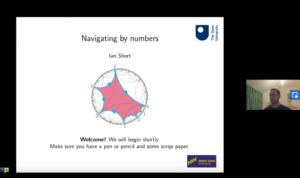
Ian Short’s session “Navigating by numbers” covered a range of frieze patterns.
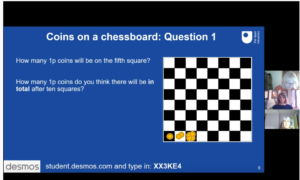
The Mathematics Education Team (Sue Forsythe, Rebecca Rosenberg and Cathy Smith) delivered a session on “Growing Exponentially”, looking at the famous coins on a chessboard problem, how children grow and of course the exponential grow of the Covid-19
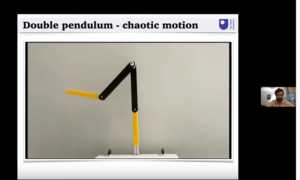
Marc Pradas demonstrated chaos theory using his specially designed double pendulum model as part of his session “Chaos theory and the butterfly effect”.
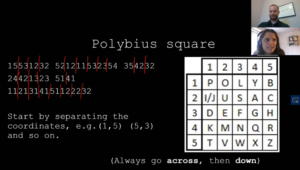
Katie Chicot and Andrew Potter’s session on Code breaking and cryptography included a range of historic codes from the ancient Greek Polybius square, to a final frequency analysis challenge. Participants were challenged to compete against the clock (and each other) to decipher codes.
Missed these sessions? No problem! One of the best things about our outreach being online at the moment, is that we can record our talks and workshops. You can watch (and play along) with all of our “Maths Week Scotland” sessions here: https://t.co/AaLnbb7Vkl?amp=1
*Please note that the interactivities will not be live but you can still have a go at all the challenges, as the solutions are revealed in each recording.
Ask the experts!
Several of our academics offered interactive talks on topics relating to the current pandemic. You can watch these sessions (and other STEM experts) here: https://www.youtube.com/playlist?list=PLar-D-A84stgtlE7bIHj75vZarXf1T1LK
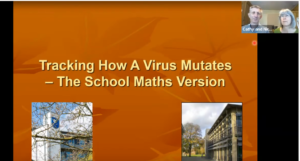
In Ask the experts: “Tracking how a virus mutates” OU academic Dr Cathy Smith, and guest speaker Dr Nick Goldman, spoke about the way Covid-19 has mutated.
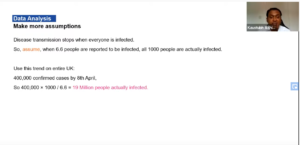
In Ask the experts: “Trusting statistics in the news” with Dr Kaustubh Adhikari, Dr Katie Chicot and Emeritus Professor Kevin McConway, the academic gave expert tips on how to understand statistics in the news, and when to trust what is being published.
Events coming up!
Mathematics masterclasses for year 9 students
We are currently in the middle of our Year 9 masterclass series, with over 100 school students in attendance each week, covering topics from Topology to Islamic Geometry.
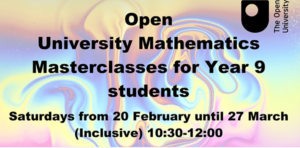
British Science Week (5th to 14th March)
The dates of our sessions are being finalised but our planned sessions are:
- Chaos Theory and the butterfly effect with Dr Marc Pradas, linking to our applied mathematics modules
- Surprising statistics with Dr Kaustubh Adhikari, linking to our statistics modules
- Magic mathematics with Charlotte Webb and Rebecca Rosenberg, using ideas from our mathematics education modules
All sessions will be broadcast through the Open University STEM Youtube channel, here: https://www.youtube.com/channel/UCo2SBgH_uGV1563RE5at8Cw

So, what has it been like delivering outreach during a pandemic?
I spoke with colleagues who have been involved in online outreach activities during the pandemic about their experiences. Their responses are summarised below:
Were there any advantages to running events online?
“The major advantages for me were fact that we were able to reach a much wider audience, and the fact that we were able to use our MK-based colleagues more easily for events around the country, not just around MK.”
We have been extremely pleased to welcome school students, adults and families who may not be able to attend our face to face sessions. Our year 9 masterclasses, normally run at Bletchley Park and at Bradford University, have attracted over 100 students each week and we have really enjoyed being able to spread our love of mathematics even more widely.
“The fact that we could record the sessions means that they are there on YouTube and we can continually reuse them by directed people to them on social media”.
What worked well in online outreach events?
“I had a web camera on my laptop pointing at my face. I also had a movable camera pointing down at my desk. In Zoom and other video conferencing things you can switch between the two cameras at a click of a button. That worked well”.
Many speakers spoke about varying the sessions, for example using short video clips alongside interactivities, rather than just slides in order to keep audiences engaged.
“We used Menti.com (a quiz app) which really seemed to work well. I also think it worked well to give the participants a challenge to try at home and to post up on social media. This allowed the learning to continue outside of the session itself”.
Using interactive software meant that participants could interact in real time, sending in answers anonymously. This helped generate a competition element in some of the sessions and graphs of polls were shared in others. The added advantage of anonymity allowed participants to interact in the sessions without fear of getting it wrong.
Most colleagues commented that online sessions needed to be shorter than face to faces ones, since it can be harder to concentrate on a screen for an extended period of time.
Working with another person was also referred to by all the speakers as this allows for a natural “lively” conversation but also any technical support, e.g. checking on the chat box.
“Using break out rooms allowed conversation between participants in smaller groups (often still only in the chat box)”
What were the challenges or limitations of presenting external engagement online?
In most of our sessions, the chat box was utilised far more than participant videos or microphones. As an OU tutor I find this is the case with our students as well, so was not surprised to hear this. Participants appear to feel more comfortable answering through text. Some saw this is a challenge, other speakers were OK with this as a form of interaction.
“For interactiveness, I find online seriously limiting. I can’t see what the listeners are up to. I would like to get them building models, experimenting. Most don’t want to put their cameras on and share. Really changes the dynamic”.
When running our masterclasses, for example, one of the aims is to connect students with other likeminded students from other schools. In an online environment it is difficult for participants to communicate with each other if not using break out rooms. Break out rooms have safeguarding issues associated with them if working with school students and many of our speakers chose not to use them.
In a face to face session, presenters can adapt based in how the participants respond to questions or if further explanation is needed. It was a challenge for many of our presenters to judge where the group was up to when working on some of the tasks or how they were responding. Though interactive tools gave some indication of how many people were responding and if they got the answers correct, it was impossible to tell whether the tasks were appropriately challenging for the specific audience.
In addition to hearing from the academics who presented these online sessions, we received some feedback from participants who were in the audience.
“I liked how it was interactive. Even if not directly with the speaker we could still join in within the class. We did not have microphones enabled, partly because most students joined as whole classes, but they were able to use the chat box and the speaker used websites that the students could enter their answers into”.
“They (the students) valued the session and interactivities being live”
“Presenting this remotely was a great idea as all our students could benefit rather than be limited to one minibus full. Thank you for sharing.”
“I enjoyed the fact that it was interactive and engaging”
“Start was too slow and too many instructions repeated. I nearly logged off”
Things to take away when planning outreach activities online:
- Shorter sessions
- A mix of activities
- Opportunities for discussion
- Things to take away and work on later
- Interactivities – e.g. Menti.com or Desmos
- Visually interesting activities
- Using break-out rooms
- Chat box interaction
- Start promptly to avoid losing interest from audience who can simply exit with a click
Get in touch
As always, you can get in touch with us on Twitter: @OUMathsStats or you can email our outreach team at: STEM-MS-Outreach@open.ac.uk
We would love to hear from you if you have attended one of our events or have watched them on Youtube.
Please also let us know if you would like to invite some OU academics to take part in your outreach event.
